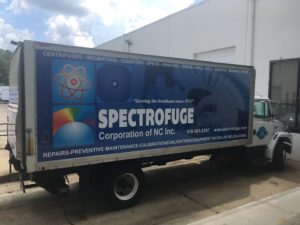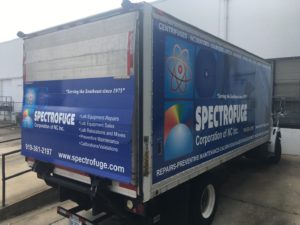Damage from fire, smoke, and water can cause critical damage to sensitive laboratory equipment. As a well-respected laboratory equipment service company in our service areas, Spectrofuge can provide knowledgeable and efficient inspections of your affected laboratory equipment. Spectrofuge will work closely with your research and administrative personnel to provide comprehensive assessments of potential damage to your equipment. Our service specialists can provide thorough cleaning and inspection of your sensitive laboratory equipment to restore the equipment to proper operational condition with minimal downtime. Please call 919-361-2197 to speak to one of our experienced service specialists about your equipment.
Extending the Life of “Obsolete” Laboratory Equipment
“That centrifuge is obsolete.” “We no longer support that model spectrophotometer.” “Parts for your laboratory shaker are no longer available.” “The part you need for your scintillation counter has been discontinued and there is not a replacement.” In the laboratory equipment service world, these statements are very common, and seem to occur more and more frequently. In fact, you may have been told this about a centrifuge or an incubator that you purchased just 10 years ago or less. As technology changes, advances in R&D are discovered and instrumentation design is improved, and the equipment manufacturers phase out instrumentation faster and faster to make room for sales of the newer models.Continue reading
What Are Spectrofuge’s Service Rates and How Are These Rates Established?
Spectrofuge takes great pride in making sure that our labor rates are competitive, reasonable, yet not exorbitant. Skilled technicians with the expertise needed to properly assess malfunctions in laboratory research equipment and perform necessary repairs are vital to our business. Laboratory research equipment have a wide variety of operational systems, that include mechanical parts, drive motors, electronic circuit boards, temperature regulating systems, digital and analytical components, internal computers with instrument specific software, radioactive sources, vacuum pumps, robotic arms, bearing assemblies, as well as other components. Spectrofuge technicians are cross-trained in as many types of equipment as possible, with several technicians that are more skilled in some areas than others. Spectrofuge technicians have over 150 years combined of working on laboratory research equipment. Several of our technicians have been with Spectrofuge for over 20 years. Spectrofuge also offers its customers a source for repairs of older equipment, equipment that is not supported by the original manufacturer, and obsolete equipment. Spectrofuge technicians have years of repair history with many older models of laboratory equipment and the problems those models experience. Our technicians have available to them surplus parts and equipment for troubleshooting and repairing the old equipment. Our hourly rates take into account all these variables as well as the labor rates of our competitors
For all Spectrofuge service calls, we charge an up-front fee, which is referred to as an on-site charge. This is a one-time fee that is charged to all of our customers who request a service call on a piece of laboratory equipment. Our customers routinely have questions about what this on-site charge covers and includes. The on-site fee covers expenses that the customer does not necessarily see but that do exist. The on-site fee covers expenses like travel costs for our technicians, including fuel and vehicle upkeep, costs of maintaining a competent central business office with knowledgeable and experienced staff that support all aspects of a service business, maintaining up-to-date manuals and service literature for laboratory equipment we service, costs of proper testing equipment and tools for the service technicians, as well as other costs. Our customers from time to time will ask us if an on-site charge can be waived if we are in the building or split with another customer in the same building. To be fair to all of our customers, it is not possible to choose which customers should or should not receive the on-site charge. Spectrofuge strives to be transparent in explaining all of its rates and realizes that customers will have questions.
Spectrofuge’s labor rates reflect all the knowledge, cross-training, historical information, and years of experience outlined in the information stated above. Laboratory research equipment is expensive to purchase and it is expensive to repair and maintain. Spectrofuge technicians are committed to giving you the best possible service for your money and we stand by our repairs. Since 1975, customer satisfaction has been key to our successful business and is our goal every time one of our technicians walk into your research lab.
Spectrofuge: Your Turnkey Professional For Your Sensitive Lab Equipment Relocation
Moving a scientific research lab can be a daunting experience for a lab manager and all the lab personnel. From small equipment like roller drums to spectrophotometers to complete HPLC systems, labs must consider many issues when planning their lab move. In our experience, labs will secure the services of general movers for all their laboratory equipment from the smaller items to the larger, more sensitive pieces of equipment. These general movers may have years of commercial moving experience for equipment like printers, computers, monitors, and in many cases, laboratory research equipment. Spectrofuge is sure that these general movers can move the less critical and less sensitive equipment. In our experience, general movers have limited experience with the operations of the more sensitive laboratory research equipment like HPLC/FPLC systems, robotic imaging systems, centrifuges, and liquid scintillation counters. Spectrofuge does not advise that these general movers relocate your sensitive laboratory equipment. Improper preparation, transportation, and reinstallation of sensitive laboratory equipment can lead to damage to the equipment, expensive repairs, costly downtime of the equipment, and time-consuming insurance claims.Continue reading
Should My Lab Purchase a Service Contract for our Lab Equipment?
What Should I Consider When Thinking About Getting a Service Contract?
There are several factors you should consider when contemplating whether or not you want to buy a service contract for your laboratory equipment. One of the most important factors to think about is how important the piece of equipment is to the function of your lab. You should consider what would happen to your lab’s productivity if this piece of equipment were to break down. Do you have equipment that can be used while the other is out of service? Will you able to wait weeks for the piece of equipment to be repaired? If the answer to either of these questions is “no”, then you should seriously consider purchasing a service contract for your equipment. A service contract will ensure that you can have your equipment repaired in a timely manner so that you can continue your research.
Centrifuge Care and Maintenance in the Lab
How Is a Centrifuge Used?
Centrifuges are used to increase the sedimentation rate of particles by using centrifugal forces, which are forces that are greater than gravity. Centrifuges consist of several parts including a rotor, motor, imbalance detector, tachometer, safety lid, and braking system. Some centrifuges also include a refrigeration system. They are classified into three categories: low-speed, high-speed, and ultra-speed. Low-speed centrifuges are used to separate serum or plasma from red blood cells, and to harvest and purify various precipitates and cell fragments. High-speed centrifuges are used to separate cell constituents. They are also used to isolate and purify viruses. Ultracentrifuges are mainly used to isolate and purify membrane components.Continue reading
Rotor Care and Safety
What Is a Rotor? How Is It Used?
Manufacturers of laboratory centrifuges such as Sorvall, Beckman, and Eppendorf also manufacture rotors for their centrifuges. In laboratory centrifuges, the rotor acts as a rapidly rotating container, spinning at very high rates of speed. Centrifugal force is created during these spins, acting on the rotor and its contents to achieve various research purposes. There are three type of rotors: swinging-bucket rotors, fixed-angle rotors, and vertical rotors. Swinging-bucket and fixed-angle rotors are most often used in benchtop, low-speed, and high-speed floor-model centrifuges. Vertical rotors are frequently used in ultracentrifuges. Swinging-bucket rotors are used to separate large-volume samples at low speeds, while fixed-angle rotors are used for basic pelleting differential separations. Vertical rotors are typically used for isopycnic separations, such as the banding of DNA in cesium chloride. Continue reading
Obstacles Faced by Third Party Service Companies
When Larry Autry, founder of Spectrofuge Corporation of NC, Inc. made the decision to start a third party laboratory equipment service company in 1975 he knew there would be obstacles to face. As a small business competing with large manufacturers of centrifuges and other types of laboratory equipment, Spectrofuge had to find ways to obtain parts, service literature, service manuals, and technical support. This is not as simple as just setting up an account with the manufacturers. The equipment manufacturers were not very helpful with providing information to a third party service company that was going to be competing for their business.
Other industries have faced these obstacles with major manufacturers, specifically the auto repair industry. The “Motor Vehicle Owners’ Right to Repair Act”, sometimes referred to as “Right to Repair”, is a name for several related bill proposals in the United States Congress and some state legislatures that would require automobile manufacturers to provide the same information to independent repair shops as they do for dealer shops. Car manufacturers have resisted supplying parts, updates, and service information to independent auto service companies as a way to discourage their business operations.
The goal of the legislation as it was first introduced in 2001 was to end the unfair advantage of car manufacturers maintaining control over repair information that could result in independent companies turning away business due to lack of information. Various versions of these bills exist today, but they have also faced opposition.
These are the same type of obstacles faced by independent laboratory equipment service companies. Fair competition between equipment manufacturers and independent laboratory equipment service companies is impeded by the control that the manufacturers are trying to maintain over parts and service support.
Spectrofuge has worked very hard to maintain working relationships with various laboratory equipment manufacturers in order to obtain parts and service support. Spectrofuge is also a member of a national organization of independent service companies, the National Independent Service Association (NISA), which allows for the sharing of information. It also enables independent service companies to build a network of resources to address some of the issues faced by independent service companies. Spectrofuge realizes that fair and equal competition makes for better business practices in order to give the customer the best possible service options at fair prices.
Spectrofuge service specialists have established and maintained strong relationships with customers since 1975, gaining their trust and respect to work on their laboratory equipment. Spectrofuge service specialists realize that the equipment users have other options for servicing their equipment. Our customers deserve knowledgeable service at a reasonable cost in a timely manner.



